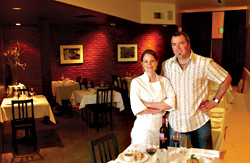Back in America’s glory days, when people sat on their front porches on summer evenings and threw garden parties and wore aprons while they cooked, recipes spread virally—or so the story goes. If the Joneses had the Smiths over for supper and served clam dip made with some ineffable spice, they’d surely be asked: “What’s the secret ingredient?” The Joneses, being neighborly, would fess up. Then, the following week, the Smiths would try to re-create the dip, adding and subtracting ingredients along the way. At their next dinner party, they could pass the modified dip off as their own—provided, of course, they hadn’t invited the Joneses.
Whether or not you believe such sepia-toned tales of a kinder, friendlier, more communal way of cooking, there’s little doubt that the newest generation to step into the kitchen is very different from its predecessors. “This is a generation that essentially does not know how to cook,” says Jerry Gulley, editor in chief of AllRecipes.com, a locally headquartered recipe-sharing site. “A good chunk of these people grew up without that kind of mentoring in the home.” AllRecipes and its leading locally based competitor, Recipezaar.com, seem to have hit upon a solution to Generation Y’s cooking woes: an online, nationwide version of the same kind of neighborly recipe exchange that yesteryear’s Joneses and Smiths might have engaged in. Search for “clam dip” on either site and you’ll find ample proof of that eternal culinary principle: There’s no one way to bake a cake (or open a clam).
“We truly believe that some of the best cooks out there are someone’s grandma or aunt, and their recipes in olden days only went to their church groups and to members of their family,” says Gay Gilmore, a former Microsoft manager who founded Recipezaar in 1999 with her husband, Troy Hakala. In theory, those grandmas and aunts can now make the world their church group using sites like Recipezaar.
Consider the case of a Recipezaar member who lives in Arizona and goes by the handle “Rose of Sharon.” In her profile, she writes: “I grew up in a very homecooking [sic] family. I have collected cookbooks for years but my favorite is Blessed Bounty, a cookbook I made with my daughter. It has all the family favorites. I have one daughter and two grandsons who love to eat.” Blessed Bounty is a partially illustrated 83-recipe online cookbook packed with comfort food; its online publication is a privilege of premium membership, which costs $24.95 annually and also includes immunity to ads.
“Stacylu,” a premium member from Bellevue, says she’s used Recipezaar since 2001 and spends up to an hour on the site each day. The daughter of a high-school home economics teacher, she reports that Recipezaar has both improved and diversified her cooking. “I love the variety of people, the different opinions on things, and what it allows my family to experience at home,” she says.
Despite their superficial similarities, AllRecipes and Recipezaar work differently. According to Gulley, AllRecipes has a staff of around 45 people; six staffers “review recipes, post them, [and] make edits to them as necessary,” he says. Recipezaar, on the other hand, is a three-person operation: Hakala handles the programming, Gilmore deals with design and business, and a third employee monitors recipes, reviews, and photographs for inappropriate material. Other than that, Gilmore says, the site is “completely automated,” thanks to software that she and Hakala developed to process recipes—turning the names of ingredients into informative links, for example, and listing nutritional data.
If Recipezaar accomplishes so much with just three staffers, why does AllRecipes employ so many people? In short, more oversight equals stronger brand identity. “People go most of the way, but since it falls under our brand, we want to at least look at it before it goes live,” Gulley explains. That is, AllRecipes gives user submissions the 21st-century equivalent of the Good Housekeeping Seal of Approval.
Recipezaar emphasizes user autonomy by hosting discussion forums; AllRecipes features staff-written essays on such topics as “All About Spring Vegetables.” Since AllRecipes doesn’t offer paid memberships, the site includes advertisements. AllRecipes also carries recipes sponsored by Bacardi, Campbell’s, and other food giants. Whether such corporate involvement taints the recipe pool is a matter of opinion. “I think our demographics are very Middle America,” says Gulley. And what Indiana family hasn’t, at one time or another, made green-bean casserole with Campbell’s soup?
Urbanites in their mid-20s and suburban retirees alike may see AllRecipes and Recipezaar as a miracle solution to two related problems: how to find trustworthy recipes without splurging on cookbooks, and how to get in touch with other people who obsess about recipes as much as they do. Yet neither site is flawless. AllRecipes tries to foment community through newsletters and member profiles, but the lack of forums means its members’ interactions are limited to sharing and reviewing recipes. Recipezaar’s forums, on the other hand, have been a source of controversy. Users who don’t abide by the rules may be banned from the site, either because they engaged in “flame wars” on nonfood issues like politics or, as some former members tell it, because they aired complaints about Recipezaar itself.
But such friction is an inevitable by- product of any online community, and regular users say the good outweighs the bad. One former Recipezaar member told me about a group of Midwestern women, mostly in their 50s and 60s, for whom the site was an essential part of each day. The Joneses and Smiths may have moved out of your neighborhood, but clam dip is still a great way to get to know them— wherever they happen to live these days.








